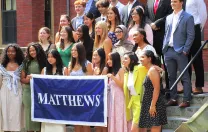As delivered
Welcome, members of the Harvard College Class of 2028.
Welcome from every continent save Antarctica. Welcome from each state in the Union—and from DC, Puerto Rico, and the US Virgin Islands.
Like me, fifty-seven of you hail from the Land of Lincoln. And two of you are named “Alan.”
A very special one of you was a summer Olympian. Thank you for making Harvard proud in Paris.
Your class is 1,650 strong. That number contains multitudes—countless ideas about what these next few years could hold for you—countless identities, ideologies, and interests—passions and pursuits.
The same is true of returning undergraduates, as well as graduate and professional students from across the University. Some of them are here today. They are of many minds about the events unfolding in the wider world, and their diversity of perspective is part of what makes this one of the richest learning environments you will ever encounter.
Being in this environment—in this community—means having rights and responsibilities.
Those gathered here have the right to express themselves freely—to dissent and protest. But they also have the responsibility to act with each of you—and the meaning of this occasion—in mind. We are convened to welcome you. Each of you should leave this gathering knowing that you are acknowledged and accepted by our community.
What else do we stand for at Harvard?
We stand for growing in knowledge and wisdom—not only through intellectual and extracurricular pursuits but through everyday interactions, through disagreement and argument, through conflict and reconciliation. You will learn at least as much from one another as you will from anyone else at Harvard—and you will learn more from difficult moments of tension than from easy moments of understanding. Be prepared to defend your point of view. Be prepared to articulate points of view that are different from your own. Be prepared, most of all, to change your mind.
We stand for seeking, supporting, and sustaining excellence from as broad, as diverse a pool of talent as possible. That is the beauty of the University. It attracts and supports interesting and ambitious individuals with different experiences and perspectives, individuals who challenge one another by virtue of being together in community. We acknowledge and celebrate that beauty—and the beauty of pluralism—with our willingness to encounter beliefs that are not our own, to be curious and respectful, to be genuinely attentive despite our tendency to be pulled in a million ways at once.
It should come as no surprise to you that this work cannot be done well on your phone. Think of how many assumptions you make when those three little bubbles let you know that someone is typing—and then how many more assumptions you make when those three little bubbles stop bubbling. Think of how much time you have devoted to unraveling those assumptions when you discover that you’ve gone down a rabbit hole of your own digging. There is no time for that now. Here you have no time to waste. Let me make a suggestion. Before the week is out, arrange to sit outside with a person you don’t know well, pick a place together in advance, and—this part’s essential—leave your phones in your rooms while you get to know each other. Fifteen minutes should be enough time.
I think you will discover quickly the virtue of removing distraction. Send me an email and let me know who you meet, how it goes, and what you learn. My email address is easy enough to remember: president@harvard.edu.
Learning to focus on another person, to listen sincerely and generously, to cultivate compassion and empathy: these are not indicators of intellectual prowess—they are qualities of humanity. You need both in equal measure if you are to hope to leave Harvard College having done what is expected of you. Open your mind, and your world will expand. Open your heart, and you’ll make lifelong friends.
I still keep in touch with people I met during my first week on campus. Much has changed since I moved into Claverly Hall in 1973, but there is one characteristic of Harvard people that has always stood out to me—and stands the test of time.
We stand for excellence. We embrace “both/and” rather than “either/or.”
What do I mean by that? Here, you will often encounter individuals who don’t accept the notion that they can do only one thing really well. You can be both a mathematician and a competitive cyclist, both a folklorist and a committed journalist, both an engineer and a graceful dancer. Combinations and permutations too numerous to mention often lead to improbable and stunning successes—and testaments to what can be accomplished in a single lifetime.
Everyone you will hear from this afternoon is here to help you realize your own take on “both/and.” We want your first overwhelming encounter with the vast landscape of opportunity before you to yield to wonder at the possibilities. We want you to feel supported in focusing on multiple interests and pursuing multiple goals. We want you to feel confident in following hunches and taking risks—and just as confident in changing course as you become more knowledgeable about who you are and what brings you joy and fulfillment.
Your time is precious. If you invest in people and situations that bring out the best in you, you will become a better version of yourself—and your years here will have been very well spent.
Speaking of your precious time, I will not take another minute more of it.
Welcome, members of the Class of 2028. I cannot wait to learn more about you—and what you learn about one another. I look forward to what you will accomplish as undergraduates both through your chosen work and in your daily dealings. Congratulations on your arrival—we are thrilled that you are here!





